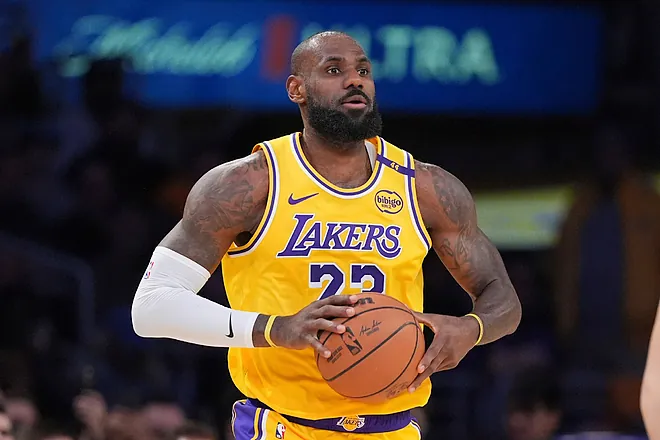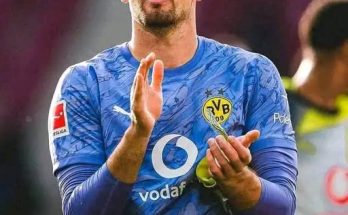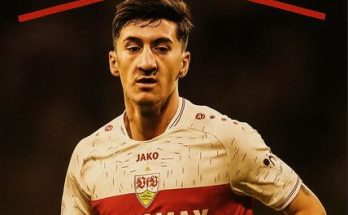In the world of professional basketball, few names carry the weight and reverence that LeBron James commands. For nearly two decades, LeBron has been the face of the NBA, a transcendent player whose dominance and leadership have shaped the league’s narrative in ways few have. When LeBron arrived in Los Angeles in 2018, he did so with the intention of leading the Lakers back to glory, to restore the franchise’s historic greatness. The purple and gold faithful embraced him as their savior, and for a time, it seemed LeBron was the undisputed centerpiece of the Lakers’ ambitions. However, as the Lakers organization pivots towards building around Luka Doncic, LeBron finds himself navigating an unfamiliar role — one that challenges his status as the unequivocal franchise cornerstone in Los Angeles.
LeBron’s journey with the Lakers has been a complex tapestry woven with both triumphs and setbacks. The initial promise of championship glory was realized in the 2019-2020 season when the Lakers captured the NBA title, the franchise’s first in a decade. That victory cemented LeBron’s legacy in L.A. and seemed to signal the dawn of a new era centered around his greatness. Yet, the reality of professional sports is often fluid and unpredictable, and the Lakers’ trajectory soon took a turn that has placed LeBron in an unusual position: sharing the spotlight with a burgeoning superstar who represents the future of the franchise.
Luka Doncic, the Slovenian prodigy, entered the NBA with a thunderous impact. From his rookie season with the Dallas Mavericks, Doncic exhibited a rare blend of scoring, passing, and basketball IQ that immediately set him apart. His ability to control games, generate offense seemingly at will, and deliver in clutch moments has earned him a reputation as one of the most exciting talents in the league. For years, the Mavericks have built their identity around Doncic’s skills and competitive fire. Now, the Lakers have made a stunning organizational decision that shifts their focus to Doncic as the centerpiece of their future, signaling a new chapter that places LeBron in less familiar territory.
This shift is not merely a basketball decision; it carries with it significant cultural and psychological implications for LeBron and the Lakers franchise. LeBron is no stranger to adapting — throughout his career, he has transitioned from the young, explosive rookie with the Cleveland Cavaliers, to the star-studded Miami Heat champion, and then to the elder statesman role in Los Angeles. Yet, the idea of moving from being the unequivocal franchise leader to sharing or ceding that mantle to a younger player is a nuanced challenge, both professionally and personally.
For the Lakers, the decision to make Luka Doncic the franchise centerpiece stems from a clear-eyed assessment of the future. At 19 years old, LeBron is in the twilight of his playing days, while Doncic, at 25, is entering his prime. The Lakers face the inevitable realities of time and athletic decline; planning for sustained success requires building around a player who can carry the torch well into the next decade. Doncic’s skill set and potential provide that foundation, making him the natural choice for the franchise’s core moving forward.
LeBron’s reaction to this transition has been layered and instructive. Publicly, he has embraced a mentor’s role, recognizing the importance of fostering Doncic’s growth and helping the Lakers evolve. This demonstrates LeBron’s maturity and understanding of the game’s cyclical nature. Behind the scenes, sources close to the team reveal that LeBron remains deeply committed to competing at the highest level, but also understands the importance of passing the baton. His leadership now includes guiding Doncic, offering advice on navigating the pressures of stardom, and helping the team build a culture that balances veteran experience with youthful energy.
This new dynamic also influences the Lakers’ on-court strategies. Whereas previous lineups were tailored to maximize LeBron’s playmaking and scoring dominance, the Lakers are now reconfiguring to integrate Doncic’s style. Doncic’s ability to create offense from virtually anywhere on the court complements LeBron’s versatility, but it also requires a recalibration of roles. The coaching staff faces the challenge of blending two generational talents in a way that maximizes team chemistry and effectiveness. This balancing act is tricky — it requires managing egos, expectations, and minutes while crafting a cohesive game plan.
Fans, too, are adjusting to this new reality. The Lakers’ fanbase has long revered LeBron as their icon, and many still see him as the face of the franchise. However, the excitement surrounding Doncic’s arrival has sparked a fresh wave of enthusiasm, particularly among younger fans eager to witness a new era of Lakers basketball. Social media conversations reflect a mix of nostalgia for LeBron’s peak years and anticipation for what Doncic can achieve in L.A. The franchise’s marketing and media efforts are shifting accordingly, placing Doncic front and center in promotional campaigns and public messaging.
The broader NBA landscape contextualizes this transition. Many teams are currently navigating generational shifts, moving from their established stars to promising young talent. The Brooklyn Nets with Ben Simmons, the Golden State Warriors with Jordan Poole, and the Miami Heat with Tyler Herro are examples of franchises balancing respect for veteran leadership with the imperative of cultivating new stars. The Lakers’ pivot towards Doncic fits within this league-wide trend, highlighting the inevitable cycles of renewal in professional sports.
LeBron’s legacy in Los Angeles remains secure, regardless of this shift. His impact transcends statistics and championships; he has been the face of the franchise during a pivotal period, brought unparalleled attention and respect, and inspired a new generation of Lakers fans. His willingness to embrace this new role with grace and professionalism adds another chapter to his storied career. Instead of seeing Doncic’s rise as a threat, LeBron’s acceptance signals a commitment to the team’s long-term success, even if it means redefining his own status.
This period also offers a valuable lesson in leadership and adaptability. LeBron’s ability to evolve, to put the team’s interests above personal glory, and to nurture a young superstar underscores why he is considered one of the greatest players and leaders in basketball history. The Lakers’ management is banking on this synergy to propel the franchise into a sustained period of competitiveness, blending LeBron’s experience and Luka’s youthful brilliance.
In the coming seasons, all eyes will be on the Lakers as they navigate this new era. The integration of Luka Doncic as the franchise centerpiece alongside LeBron James will be scrutinized at every turn. Success will depend on how well the organization manages this balance, how the players respond, and whether the team can translate individual talent into collective achievement. The Lakers have set a bold course, embracing change while honoring their storied past.
LeBron James entering this unfamiliar territory is a testament to his enduring greatness. It reflects the evolving nature of sports where even legends must adapt to the future. As the Lakers place Luka Doncic at the heart of their franchise, LeBron’s role transforms from the sole superstar to a mentor, collaborator, and still a critical contributor. This chapter in his career enriches the narrative of one of basketball’s most iconic figures, showcasing his ability not just to dominate but to lead through transition.
Ultimately, the story unfolding in Los Angeles is about more than basketball. It is about legacy, evolution, and the relentless pursuit of excellence. LeBron James and Luka Doncic represent two generations united by their love of the game and their commitment to winning. The Lakers’ decision to make Doncic the franchise centerpiece signals a new dawn, but it is also a tribute to LeBron’s enduring influence that he remains integral to that vision. As the purple and gold continue their quest for NBA glory, the partnership between these two stars will shape the future of the franchise — and perhaps the league itself — in ways only time can reveal.



